From the 100-meter dash to the 10,000-meter run, here's what to watch for in each track and field event at the 2020 Games.
On July 31, track and field returns to the spotlight at the Tokyo Olympics. Expect to see some familiar faces looking to add to historic medal hauls, as well as new stars proving themselves on the world’s biggest stage.
The United States topped the medal table at the Rio Olympics with 32 medals, including 13 gold. Kenya took second with six gold medals, six silver medals and one bronze medal. In Usain Bolt’s final Olympics, Jamaica took third with six golds, three silvers and two bronze medal finishes.
Learn more about each event’s biggest stars and storylines below. The sessions listed below are according to when they can be watched in the United States.
Friday, July 30
Morning Session—6 a.m. ET on Peacock
Men’s 10,000-Meter Final
This event will have its first Olympic gold medalist not named Mo Farah since 2008 after the British star failed to qualify for the Games. In the five years since the last Olympics, the world record in this event was lowered from 26:17.53 by Kenenisa Bekele (2005) to 26:11.00 by Uganda’s Joshua Cheptegei last year in Spain. His compatriot Jacob Kiplimo, who beat him at the world half marathon championships last fall, has the fastest time of the year with a 26:33.93 run in May. A gold medal by either would be the first for Uganda on the track since John Akii-Bua won the 400m hurdles at the 1972 Munich Games and the first gold medal for the country since Stephen Kiprotich won the marathon in 2012 in London.
Saturday, July 31st
Morning Session—6 a.m. ET on Peacock
Men’s Discus Throw
Sweden’s Daniel Ståhl is the reigning world champion and leads the world with his 71.40m season best. His personal best of 71.86m from 2019 tied him for the fourth-best discus throw in history and the farthest mark since 2008.
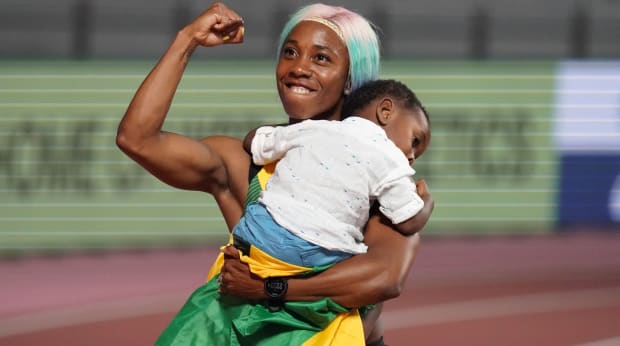
Women’s 100 Meters
This event was thrown into the spotlight after U.S. sprints star Sha’Carri Richardson
was suspended for one month due to testing positive for marijuana at the Olympic trials. She was one of the favorites, but lost amid the clamor for anti-doping reform is the fact that she wasn’t the fastest woman of the year and maybe not the favorite. That title arguably belongs to two-time Olympic gold medalist Shelly-Ann Fraser-Pryce of Jamaica, who is competing at her first Games as a mother, and looks to match Usain Bolt’s feat as the only three-time champion in this event at the Games. Fraser-Pryce, nicknamed the Mommy Rocket by fans, became the fastest woman alive when she ran 10.63 on her home soil in June.In 2016, her compatriot Elaine Thompson-Herah stopped her from winning three consecutive gold medals and will be on her tail in Tokyo as the second-fastest woman of the year with a 10.71 season’s best. Marie Josée Ta Lou (10.86 SB) of the Ivory Coast and Nigeria’s Blessing Okagbare (10.89 SB) would be the next-best runners to try and put a stop on the Jamaican dominance of this event.
Mixed 4x400-Meter Relay
The mixed 4x400-meter relay makes its Olympic debut. Each country’s relay team is composed of two men and two women. Teams can set their order in any way they want whether it’s alternating genders or having two men or two women run first. Tactics are key in this race. The United States squad of Wil London, Allyson Felix, Courtney Okolo and Michael Cherry set a world record of 3:09.34 en route to gold at the 2019 world championships.
Evening Session—8 p.m. ET on USA
Women’s Shot Put Finals
At the 2016 Olympics, Michelle Carter made history as the first American woman to win the Olympic shot put. Carter underwent surgery to remove a benign tumor in her ankle and will not defend her title. China’s Gong Lijiao is missing the gold medal to go along with her silver from 2012 and bronze from 2008. After finishing fourth at the 2016 Olympics, she won the 2017 and 2019 world championships and heads to Japan with the longest throw of the year at 20.39m.
Sunday, Aug. 1st
Morning Session – 6 a.m. ET on Peacock
Men’s High Jump
Qatar’s Mutaz Essa Barshim earned his second Olympic silver medal in 2016 behind Canada’s Derek Drouin but went on to win gold at the 2017 and 2019 world championships. However, the Olympic postponement has seen new stars soar to the top of the world list, including Russia’s Ilya Ivanyuk (2.37 SB), Belarus’s Maksim Nedasekau (2.37 SB) and the U.S.'s JuVaughn Harrison (2.36 SB). Barshim didn’t go higher than 2.27m before clearing 2.37m for gold at the 2019 world championships so he’ll have to pull off a similar feat to make the podium and hold off the younger stars.
Men’s 100 Meters
There won't be any theatrics from Usain Bolt after this race since the world-record holder retired in 2017. The triple Olympic gold medalist will be watching from home as an American possibly takes gold in this event for the first time since Justin Gatlin won gold in 2004. Christian Coleman, the 2019 world champion and the sixth-fastest man in history, is not competing since he is serving a suspension for missing three drug tests in a 12-month span. Trayvon Bromell, 26, has filled the void as the fastest man of the year with a personal best of 9.77. In 2016, he made the Olympic final and finished eighth but was competing with a heel injury that ultimately led to him being taken off the track in a wheelchair. He underwent two surgeries on his Achilles but the extra year allowed him more time to return to top form and he won the U.S. Olympic Trials. In Tokyo, he’ll face stiff competition from his compatriot Ronnie Baker (9.85 SB), 2016 Olympic bronze medalist Andre De Grasse of Canada (9.99 SB) and South Africa’s Akani Simbine, who ran an African record of 9.84 on July 6.
Women’s Triple Jump
Venezuela’s Yulimar Rojas took silver in 2016 but has taken over the event with gold at the 2017 and 2019 world championships. In May she snuck up on the world record of 15.50m, which was set by Ukraine’s Inessa Kravets in 1995, with a personal best of 15.43m. Rojas is the clear favorite, but the next-best jump of the year is 14.98m by Jamaica’s Shanieka Ricketts.
Evening Session—8 p.m. ET on NBC and USA
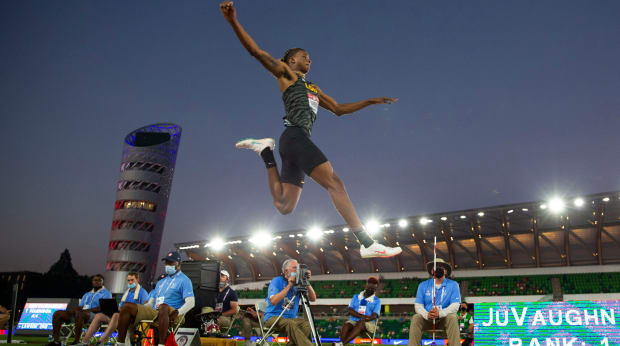
Men’s Long Jump
The Olympic gold medal can stay in the hands of an American if JuVaughn Harrison takes gold in this event. You might be thinking, "Didn’t I just see that name above under the high jump section?" Yes, you sure did. Harrison is the first U.S. man to do both events at the Olympics since Jim Thorpe in 1912. The reigning NCAA champion in both events won at the Olympic trials in a personal best jump of 8.47m. Greece’s Miltiádis Tentóglou tops the world list with a best of 8.60m. World champion Tajay Gayle of Jamaica and 2019 bronze medalist Juan Miguel Echevarría are also seeking their first Olympic medals.
Women’s 100-Meter Hurdles
The U.S. swept the medals in this event at the 2016 Games with Brianna Rollins-McNeal, Nia Ali and Kristi Castlin going 1-2-3. Team USA has historically had a stronghold in the 100m hurdles at the Olympics, winning eight of the 12 medals since 2004. A whole new cast will be competing in Tokyo, led by world-record holder and 2019 world championship silver medalist Keni Harrison, who missed the 2016 Games with a sixth-place finish at the last Olympic trials. Since Ali, the 2019 world champion, isn’t competing, Harrison is the top returner from the last championships. However, Puerto Rico’s Jasmine Camacho-Quinn has been unbeaten this year and has the fastest time in the world with a 12.32 run in April.
Monday, Aug. 2nd
Morning Session—6 a.m. ET on Peacock
Men’s 3,000-Meter Steeplechase
This event will feature a whole new podium of medalists as reigning champion Conseslus Kipruto of Kenya has not finished a race all year and is facing a criminal case in Kenya. Silver medalist and U.S.-record holder Evan Jager was scratched from the trials due to injury and bronze medalist Mahiedine Mekhissi-Benabbad of France hasn’t competed on the track all year. Kenya has won every gold medal in this event since 1984 and its best hope is 25-year-old Abraham Kibiwott, whose 8:07.81 is the second-fastest time of the year. World championship silver medalist Lamecha Girma of Ethiopia has the fastest time of the year with a 8:07.75 from the Monaco Diamond League, which may have served as a preview of the Games. Morocco’s Soufiane El Bakkali missed out on a medal in 2016 by three seconds and can’t be counted out with a personal best of 7:58.15 from 2018 that put him as the 10th-fastest man in history.
Women’s Discus
Dutch star Jorinde van Klinken, 21, is having the season of her life with a 70.22m throw in May and then a win at the NCAA championships for Arizona State. She was a world junior championship bronze medalist in 2018 but could get her first senior medal in Tokyo. Valarie Allman set the U.S. record of 70.15 last year and sits at No. 2 in the world with her 70.01m toss to win at the Olympic trials. Only two U.S. women have ever won gold in this event—Lillian Copeland (1932) and Stephanie Brown Trafton (2008).
Women’s 5,000 Meters
This could be one of the deepest 5,000-meter races in history. In October, Ethiopia’s Letesenbet Gidey broke the world record in 14:06.62. However, she was beaten by her compatriot Gudaf Tsegay, who set the indoor 1,500m world record this past winter and has run 14:13.32 on the season. Despite the fast times, Kenya’s Hellen Obiri brings the most championship experience with three world titles and the 2016 Olympic silver medal. On top of that, Sifan Hassan of the Netherlands will have her first medal shot here since she’s entered in the 1,500 meters and 10,000 meters. If it’s a sit-and-kick race, this could be one of the wildest finishes.
Evening Session—8 p.m. ET on NBC and CNBC
Men’s 400-Meter Hurdles
Kevin Young’s 46.78 world record from the 1992 Barcelona Olympics was finally taken down by Norway’s Karsten Warholm with a 46.70 victory at the Oslo Diamond League on July 1. Warholm has not lost a race since September 2018, but hasn’t faced Team USA’s Rai Benjamin since the 2019 world championship final. At the U.S. Olympic Trials in late June, Benjamin ran the third-fastest performance ever with a 46.83 and made it look easy. A U.S. man has won this event at the Olympics 19 of 26 times.
Women’s Long Jump
Brittney Reese doesn’t get enough credit for her brilliance as one of the most accomplished U.S. track and field athletes of all time. She’s a four-time world champion and has a gold medal from the 2012 Olympics. She snagged silver at the 2016 Summer Games behind teammate Tianna Bartoletta. Her 7.13m leap to win at the U.S. Olympic trials was the third-best of the year by anyone and she said she was just training through the trials. In Tokyo, she’ll have to get past Nigeria’s Ese Brume, who leads the world list with a 7.17m mark, and Germany’s 2019 world champion Malaika Mihambo, who was fourth at the 2016 Olympics. The U.S.'s young stars could also surprise with NCAA champion Tara Davis and Quanesha Burks (who worked at McDonald’s to help her family while growing up).
Tuesday, Aug. 3rd
Morning Session—6 a.m. ET on Peacock
Men’s Pole Vault
Mondo Duplantis has been a prodigy in this event since high school and, at 21 years old, already holds the world record for the pole vault outdoors (6.15m) and indoors (6.18m). He was born and raised in Louisiana, but competes for Sweden since his mother is Swedish and he spent many summers training and growing up there. Renaud Lavillenie, who was the 2012 Olympic champion, has seen a resurgence in 2021 with the second-highest vault of the year at 5.92m. He could become just the second man in history to medal three times at the Olympics. U.S. Olympic Trials champion Chris Nilsen and 2016 Olympic bronze medalist Sam Kendricks will also be in the mix as the U.S. seeks its first gold medal since Timothy Mack won in 2004.
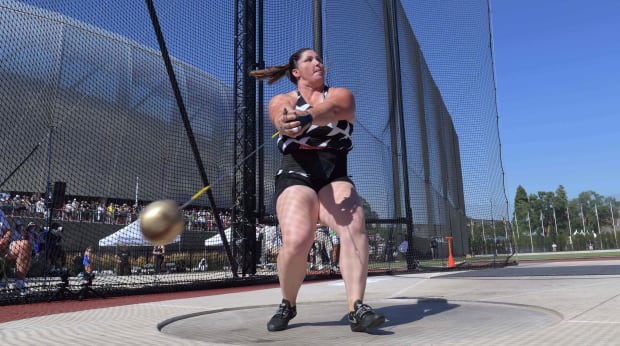
Women’s Hammer Throw
Poland’s Anita Włodarczyk is the greatest women’s hammer thrower of all time with the world record (82.98m), the top 15 throws in history, four world championship gold medals and the last two Olympic gold medals. She won 42 straight contests from 2014 to '17. However, she has not been as dominant since undergoing season-ending knee surgery in July 2019, and her season’s best of 77.93 is just third in the world. The top honors go to DeAnna Price, who bettered her own U.S. record with an 80.31m toss to win at the Olympic trials. Fellow U.S. thrower Brooke Anderson is No. 2 with a 78.18m personal best from April. Any medal would be a first for the Team USA since no woman has cracked the top five at the Olympics since the women’s event debuted in 2000.
Women’s 800 meters
All three medalists from the Rio Olympics will not be in this event as South Africa’s Caster Semenya, Burundi’s Francine Niyonsaba and Kenya’s Margaret Wambui are women with naturally high levels of testosterone, and World Athletics implemented a rule that bars them from competing in middle distance events without taking medication to reduce their levels. None of the athletes have been able to compete in their specialty event since July 2019. (Niyonsaba qualified for the Tokyo Games in the 5,000 meters.)
In their absence, Uganda’s Halimah Nakaayi surprised everyone with her world championship gold medal in 2019, but she has not won a race since then. Raevyn Rogers and U.S.-record holder Ajee Wilson, who went 2–3 at those world championships, are looking to peak in Japan. Their biggest threat will be their young compatriot Athing Mu, who won at the Olympic trials in a world-leading 1:56.07. At just 19 years old, Mu is the second-fastest U.S. woman of all-time and is coming off an outdoor season for Texas A&M in which she set the NCAA record in the 400 meters and 800 meters. Mu, Rogers or Wilson could be the first U.S. woman to win gold in the 800 meters since Madeline Manning in 1968.
Women’s 200 Meters
Gabby Thomas already has an impressive resume with a neurobiology and global health and health policy degree from Harvard. Despite a health scare this summer when doctors discovered a benign tumor in her liver, Thomas pushed forward and became the second-fastest woman in history with a victory at 21.61 at the Olympic trials. Only world-record holder Florence Griffith Joyner (21.34) has run faster. Thomas may have an edge as she comes into this event fresh while Jamaica’s Shelly-Ann Fraser-Pryce may have three rounds of the 100 meters on her legs at this point. Shaunae Miller-Uibo of the Bahamas won gold in the 400 meters at the 2016 Olympics with an epic dive at the finish line but has decided to focus on the 200, where she owns a personal best of 21.74. Her best finish at a global championship in the 200 meters was bronze at the 2017 world championships in London.
Evening Session—8 p.m. ET on NBC and USA
Women’s 400-Meter Hurdles
The women’s 400-meter hurdle world record stood for 16 years until 2016 Olympic champion Dalilah Muhammad lowered it from 52.20 to 52.16 with a win at the 2019 world championships. In both races, she was holding off a charging Sydney McLaughlin, who made her first Olympic team at 17 years old in 2016. Five years later, McLaughlin took over as the best ever with a win in world-record fashion at the Olympic trials in 51.90. At least one U.S. woman has medaled in this event at the last three Olympics. McLaughlin and Muhammad appear to be strong bets to continue the trend with possible gold and silvers, but who will be first?
Wednesday, Aug. 4
Morning Session—5:30 a.m. ET on Peacock
Men’s Hammer Throw
Poland’s Pawel Fajdek is a four-time world champion but has yet to win an Olympic medal. He looks to change that as he enters with the year's farthest throw after an 82.98m heave in May. Rudy Winkler has momentum on his side after a breakthrough at June’s U.S. Olympic Trials where he broke the U.S. record with a 82.71m throw. Team USA hasn't won gold in the men's hammer throw since Hal Connolly in 1952 or medaled since Lance Deal in 1996.
Men’s 800 Meters
Kenya has won the last three Olympic gold medals, including David Rudisha’s world-record run in 2012, which is considered one of the best races in history. However Rudisha, who hasn't raced since 2107, will not return to defend his Olympic title. Kenya’s best chances for gold rest in the hands of Emmnauel Korir and Ferguson Rotich, who have run 1:43.04 and 1:43.57 on the year, respectively.
U.S. record holder and reigning world champion Donavan Brazier will not be competing since finishing last at the trials while injured. Defending Olympic bronze medalist Clayton Murphy can’t be overlooked after his 1:43.17 to win the U.S. Olympic Trials. His fellow Team USA member Bryce Hoppel has run only 1:44.14 on the year but is getting past a hamstring strain to possibly podium after taking fourth at the 2019 world championships.
Botswana’s Nijel Amos has resurrected his career and is looking for his first medal since taking silver behind Rudisha in 1:41.73, which makes him the fourth-fastest man in history. He has run the fastest time of 2021 with a 1:42.91 season's best.
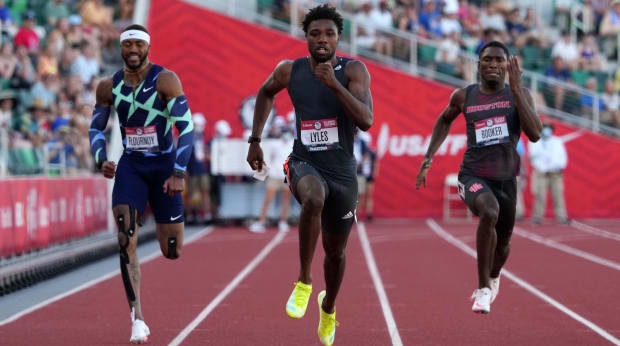
Men’s 200 Meters
Usain Bolt claimed gold in this event at the last three Olympics, so a new champion will be crowned in Tokyo. The 24-year-old Noah Lyles has taken up Bolt’s mantle as the dominant half-lapper with a gold medal from the 2019 world championships along with the eighth-fastest time in history with a 19.50 personal best. Lyles’s biggest challenge may come from 17-year-old Erriyon Knighton, who ran 19.88 at the U.S. Olympic Trials to break Lyles’s U.S. high school record. Knighton is the youngest man to make the U.S. track and field Olympic team since Jim Ryun in 1964.
Women’s 3,000-Meter Steeplechase
This is just the fourth edition of the women’s steeplechase at the Olympics since the event was added in 2008. No woman has ever medaled twice and 2016 Olympic champion Ruth Jebet of Bahrain won’t get the chance since she was suspended for testing positive for EPO in 2018. Silver and bronze medalists Hyvin Kiyeng Jepkemoi of Kenya and Emma Coburn of the U.S. come back with strong chances at the podium. Coburn shocked the world when she and U.S.-record holder Courtney Frerichs went 1–2 at the 2017 world championships. In 2019, Kenya took back the gold with Beatrice Chepkoech winning in a championship record of 8:57.84. It could take a sub-9-minute performance to medal at the Games.
Evening Session—8 p.m. ET on NBC and USA
Men’s Triple Jump
Christian Taylor, the 2012 and 2016 Olympic champion in this event, ruptured his Achilles in May and will not be able to defend his title. In his absence, fellow U.S. jumper Will Claye, who was the silver medalist behind him at every global championship since the 2016 Olympics, gets his best chance at gold. Claye jumped 17.21 meters to win the U.S. Olympic Trials, which puts him at No. 8 in the world heading into Tokyo. Portugal’s Pedro Pablo Pichardo has the world-leading mark of 17.92m and is a two-time world championship silver medalist.
Men’s Shot Put
This event had one of the wildest endings at the 2019 world championships, when 2016 Olympic silver medalist Joe Kovacs threw 22.91 meters to win his second world championship gold medal just one centimeter ahead of 2016 Olympic gold medalist Ryan Crouser. In 2021, Crouser took things up a notch when he broke the world indoor shot put record in January and then took down the outdoor world record of 23.12 by Randy Barnes, which had stood since 1990, with a monster 23.37m toss at trials. Crouser has recorded more than 130 throws farther than 22 meters in his career. He can become the first back-to-back Olympic gold medalist since Parry O’Brien won in 1952 and 1956.
Men’s 110-Meter Hurdles
In a strange development at the Jamaican Olympic Trials, reigning 110-meter hurdles Olympic champion Omar McLeod dealt with cramps and finished last in the final. He pleaded for a medical exemption in a Hail Mary effort to get named to the national team for Tokyo but was left off despite being the second-fastest man in the world since the Rio Olympics. McLeod could have been the biggest challenger for U.S. star and reigning world champion Grant Holloway, who ran 12.81 in the U.S. Olympic Trials semifinal to give Aries Merritt’s 12.80 world record a scare. Holloway is the only man to go under 13 seconds on the year.
Thursday, Aug. 5
Morning Session 6 a.m. ET on Peacock
Men’s Decathlon
What's left to accomplish in the sport when you have two Olympic gold medals and the world record? It’s a question Ashton Eaton faced after his victory in Rio De Janeiro, which ended up being his final time out on the track. At just 29 years old, he announced his retirement in January 2017 and the sport sought its next decathlon star. At the 2017 world championships, France’s Kevin Mayer (who took silver behind Eaton in Rio) stepped up. A year after that, he took the world record by posting a score of 9,126 points. Mayer had to pull out of the 2019 world championships during the pole vault due to an injury. He has recovered and a win in Japan could take him to the 2024 Olympics in Paris as the reigning Olympic champion.
Men’s 400m Final
The U.S. has not swept the Olympic gold medals in the 100-200-400 since Justin Gatlin, Shawn Crawford and Jeremy Wariner did in 2004. Team USA has a chance with Trayvon Bromell, Noah Lyles/Erriyon Knighton and Michael Norman in 2021. Norman won at the U.S. Olympic Trials in 44.07, which is the second-fastest time of 2021 behind fellow U.S. Olympian and NCAA champion Randolph Ross. Norman’s personal best of 43.45, which he ran in April 2019, is the fastest since South Africa’s Wayde Van Niekerk ran the 43.03 world record out of lane eight in the 2016 Olympic final. Van Niekerk benefited from the pandemic postponement as he continues to try to find his old form since tearing his ACL and meniscus during a celebrity rugby match in 2017. He has not broken 44 seconds since 2017.
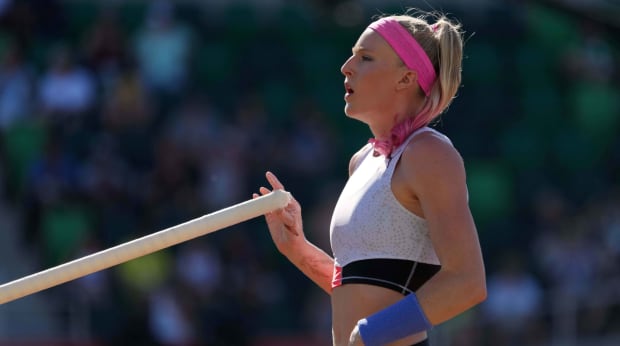
Women’s Pole Vault
Greece’s Katerina Stefanidi has not missed a podium since her Olympic gold medal in 2016. She took gold a year later at the world championships before settling for bronze in 2019. Russian Anzhelika Sidorova won gold at the 2019 world championships and has the second-highest vault of 2021 with a 4.91m clearance. However, a new star has emerged in Team USA’s Katie Nageotte, whose 4.95m clearance took the top spot at trials. Nagoette’s only previous appearance at a world championship or Olympics was her seventh place finish at the 2019 world championships, but she’s undefeated this season in her two Diamond League appearances. Sandi Morris, the 2016 Olympic silver medalist and 2017 and '19 world championship silver medalist, looks to become just the second U.S. woman with two Olympic medals.
Women’s Heptathlon
Belgium's Nafissatou Thiam, who won gold in Rio, goes up against Great Britain’s Katarina Johnson-Thompson, who won the 2019 world championship title for the first time in nearly two years. Johnson-Thompson suffered a ruptured Achilles injury in 2020 that has kept her from competing in a heptathlon but she told Reuters that she has made a full recovery. Thiam has already declared to The Times, “I’ll be hard to beat.” Fans will have the pleasure of watching these two stars battle over seven events. Annie Kunz won at the U.S. trials with a world-leading 6,703 points total and will try to be the first American medalist since Hyleas Fountain took silver at the 2008 Olympics.
Friday, Aug. 6
Women’s Marathon 6 p.m. on USA
Kenya’s Brigid Kosgei shattered the women’s marathon world record running 2:14:04 at the 2019 Chicago Marathon—taking 81 seconds off Paula Radcliffe’s previous mark. Kosgei has also won the last two London Marathon but how she fares in a championship-style race without pacemakers is the biggest question around her. Her compatriot Ruth Chepngetich has proven herself on that stage with a win at the 2019 world championships under brutally hot conditions. She owns a personal best of 2:17:08 (No. 4 all-time) and in April broke the half marathon world record in 64:02. A gold medal for Kenya would be the second in the country’s history but 2016 Olympic champion Jemima Sumgong later tested positive for EPO and was banned eight years for lying and fabricating medical records to cover it up. The U.S. will have Aliphine Tuliamuk, Molly Seidel and Sally Kipyego competing. Tuliamuk is racing in her first marathon since giving birth to her daughter in January.
Morning Session 6:50 a.m. ET on Peacock
Men’s 5,000m
This is another event where the gold medal will be handed to a new champion since Mo Farah took this race at the last two Games. Team USA’s Paul Chelimo, who finished behind him in Rio, fended off hard closes by Woody Kincaid and Grant Fisher to win trials. The American contingent all hold personal bests faster than 13:02 but this could be one of the fastest 5,000 meter races in history with such a talented field, which includes world record holder Joshua Cheptegei of Uganda (12:35.36 PB), Ethiopia’s Selemon Barega (12:43.02 PB), Mohamed Ahmed of Canada (12:47.20), Norway’s Jakob Ingebrigtsen (12:48.45) and Canada’s Justyn Knight (12:51.93). All-time great Kenenisa Bekele of Ethiopia won the 2008 Olympic title in 12:57.82 and it wouldn’t be crazy to think that with a field this stacked, that may not get a medal.
Men’s 4x100m Relay
Jamaica has won the last three Olympic gold medals in the 4x100 meters with Usain Bolt on each team. However, the 2008 gold medal-winning squad had to forfeit their win after lead-off leg Nesta Carter tested positive for a banned substance upon a re-testing of drug samples from those Games. The U.S. has had its podium woes with bad handoffs and failed to medal at the last three Games. This race is wide open but Team USA will be fielding a much different squad from its group that won gold at the 2019 world championships so the question marks persist.
Women’s Javelin
Poland’s Maria Andrejczyk has thrown farther than any other woman this year with a world-leading 71.40m mark and seeks redemption from a fourth-place finish at the 2016 Olympics. At 25 years old, she has yet to medal at any global championship. A Polish woman has not medaled in this event since the 1936 Summer Games. China fields world championship silver and bronze medalists Liu Shiying and Lü Huihui, who are trying to get the country’s first Olympic medals in this event.
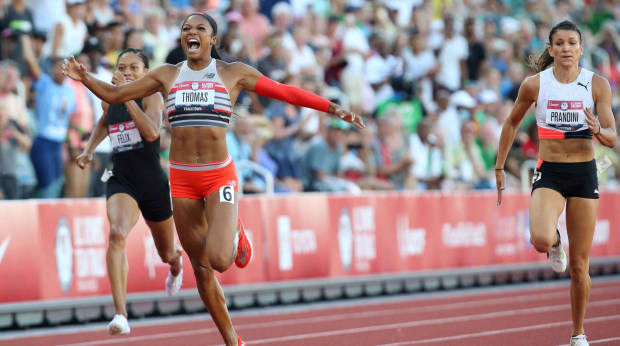
Women’s 400m
Many broadcasts will fixate on Allyson Felix competing in her fifth Olympics and seeking her 10th Olympic medal to tie Carl Lewis for the most all-time by a U.S. track and field athlete. She has a shot at the medals because many of the fastest women in this event have opted not to contest it in Tokyo.
In early July, it was revealed that 18-year-old Namibians Christine Mboma and Beatrice Masilingi, who have run 48.54 and 49.53 (the No. 1 and No. 3 times on the year), have naturally high levels of testosterone so they are ineligible to compete in any event from 400 meters to the mile. They’ve declared for the 200 meters, where 2016 Olympic champion Shaunae Miller-Uibo and Jamaica’s 2019 world championship bronze medalist Shericka Jackson will also be competing. Salwa Eid Naser, the 2019 world champ, cannot compete since after missing three drug tests within a 12-month span.
As a result of the shuffle, Team USA’s Felix, Quanera Hayes and Wadeline Jonathas have a chance at any of the medals.
Women’s 1,500m
Reigning champion Faith Kipyegon of Kenya can become the first woman to win back-to-back Olympic gold medals in the 1,500 meters since Tatyana Kazankina won in 1976 and '80 for the Soviet Union. If the Monaco Diamond League in July served as a preview of what’s to come, Kipyegon is the favorite. She set a Kenyan national record of 3:51.07 to beat reigning world champion Sifan Hassan of the Netherlands. Great Britain’s Laura Muir, Ethiopia’s Freweyni Hailu and the U.S.’s Elle Purrier St. Pierre can’t be discounted if the race comes down to a kick in the final lap.
Women’s 4x100 Meters
The U.S. looks to make it three gold medals in a row. In 2012, Tianna Bartoletta, Allyson Felix, Bianca Knight and Carmelita Jeter broke the world record with a 40.82 second run in the Olympic final. Bartoletta and Felix returned four years later to join English Gardner and Tori Bowie to the second-fastest performance in history en route to gold in 41.01. Jamaica’s 41.44 to win the 2019 world championships was the eighth-fastest relay in history so they will try to win gold for the first time since 2004.
Saturday Aug. 7
Men’s Marathon at 6 p.m. on USA
Kenya’s Eliud Kipchoge has the Olympic gold medal, the world record of 2:01:39 and the only run in history under two hours (a world record ineligible exhibition race where he ran 1:59:40 in October 2019.) He’s already considered one of the greatest runners in history. Last October, he suffered his first marathon loss in seven years but he returned to his winning ways with a 2:04:30 marathon held at an airport in The Netherlands in April. Kipchoge can become just the third man to win back-to-back gold medals at the Summer Games.
Ethiopia will turn to Birhanu Legese (2:02:48 PB) and 2020 London Marathon winner Shura Kitata to try and claim gold for the first time since 1968. It has also been that long since the host nation boasted a medal in the Olympics. Japanese distance running has been on the rise for the past decade and professional runners have had their targets set on claiming the country’s first marathon medal since silver in '68. Yuma Hattori (2:07:27), Shogo Nakamura (2:08:16), Suguro Osako (2:05:29) comprise the strongest contingent Japan could assemble.
Morning Session at 6 a.m. on Peacock
Men’s Javelin
Jan Zelezný’s world record of 98.48 meters from 1996 is on watch. Germany’s Johannes Vetter is the heavy favorite in this event for Tokyo and holds the No. 2 and No. 3 farthest throws in history with a 97.76m personal best set last September and a 96.29m throw for the best mark of 2021. He hasn’t lost a competition since taking bronze at the 2019 world championships behind Granada’s Anderson Peters and Estonia’s Magnus Kirt.
Men’s 1,500 Meters
Kenya’s Timothy Cheruiyot had not finished worse than second at any race in the past four years before falling to fourth place at the Kenyan trials in June. It looked like the reigning world champion would miss the Olympics but he replaced Kamar Etyang (the Kenyan trials runner-up) on the team because the 18-year-old had not met the minimum requirement of out-of-competition drug tests for Olympic selection. Officially on the team, Cheruiyot is the favorite after winning the Monaco Diamond League in a personal best of 3:28.48 for the fastest time of the year.
Matthew Centrowitz, whose gold medal run in 2016 ended a 108-year drought for Team USA, returns and recently ran a 3:49.61 mile to move up to No. 5 on the U.S. all-time list. He was beaten in the 1,500 meter final at the trials by University of Oregon phenom and NCAA champion Cole Hocker. Norway’s Jakob Ingebrigtsen (who has run 3:28.68 and won European championship medals in this event) and Hocker will try to become among the youngest Olympic 1,500m champions in history.
Men’s 4x400m Relay
The United States has won seven of the last eight world championship gold medals in this event and will also look to defend its Olympic gold from Rio.
Women’s High Jump
Russian Mariya Lasitskene won one of two gold medals for the Authorised Neutral Athletes team (since Russia remains banned from international competition due to systematic doping sanctions from the World Anti-Doping Agency) at the 2019 world championships and could try to do the same at the Olympics where she’ll compete as a member of the Russian Olympic Committee. Ukraine’s Yaroslava Mahuchikh finished behind her at the 2019 world championships and has the highest clearance of the year with a 2.03m season best. Team USA’s medal hopes lie in the hands of 23-year-old Vashti Cunningham, the daughter of former Eagles great Randall Cunningham, competing in her second Olympics.
Women’s 10,000 meters
In 2016, Ethiopia’s Almaz Ayana opened the track and field portion of the Games by blasting a 29:17.45 world record. She asserted her dominance again in 2017 with another world championship gold but has struggled with injuries and has been absent from competition since 2019. Now, her world record is also absent from the top of the all-time list as Sifan Hassan of the Netherlands ran a 29:06.82 on June 6 to break the world record in Hengelo. Just two days later, Ethiopia’s Letesenbet Gidey lowered the mark on the same track with a 29:01.03 to win the Ethiopian trials. Tokyo will be just their second clash at 10,000 meters. At the 2019 world championships, Hassan took the win in 30:17.62 while Gidey settled for silver four seconds back.
Women’s 4x400 Meters
The U.S. women look to make it seven Olympic gold medals in a row. Allyson Felix has been part of the last three squads to take the wins and could make it four in Tokyo to cap off her Olympic legacy.
More Olympics Coverage:
• The USWNT's Off-Brand Olympics
• Ledecky's Loss Adds Another Layer of Intrigue to Her Story
• Simone Biles, Naomi Osaka Signal New Era of Prioritizing Mental Health
• U.S. Rugby Star Carlin Isles Is Competing in Memory of His Brother at Olympics
No comments:
Post a Comment